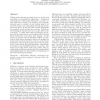Free Online Productivity Tools
i2Speak
i2Symbol
i2OCR
iTex2Img
iWeb2Print
iWeb2Shot
i2Type
iPdf2Split
iPdf2Merge
i2Bopomofo
i2Arabic
i2Style
i2Image
i2PDF
iLatex2Rtf
Sci2ools
120
click to vote
ADC
2006
Springer
2006
Springer
Recency-based collaborative filtering
Collaborative filtering is regarded as one of the most promising recommendation algorithms. Traditional approaches for collaborative filtering do not take concept drift into account. For example, user purchase interests may be volatile. A new mother may be interested in baby toys, although previously she had no interest in these. A man may like romantic films while he preferred action movies one year ago. Collaborative filtering is characterized by concept drift in the real world. To make time-critical predictions, we argue that the target users’ recent ratings reflect his/her future preferences more than older ratings. In this paper, we present a novel algorithm namely recencybased collaborative filtering to explore the weights for items based on their expected accuracy on the future preferences. Our proposed approach is based on itembased collaborative filtering algorithms. Specifically, we design a new similarity function to produce similarity scores that better reflect ...
Related Content
| Added | 13 Jun 2010 |
| Updated | 13 Jun 2010 |
| Type | Conference |
| Year | 2006 |
| Where | ADC |
| Authors | Yi Ding, Xue Li, Maria E. Orlowska |
Comments (0)

